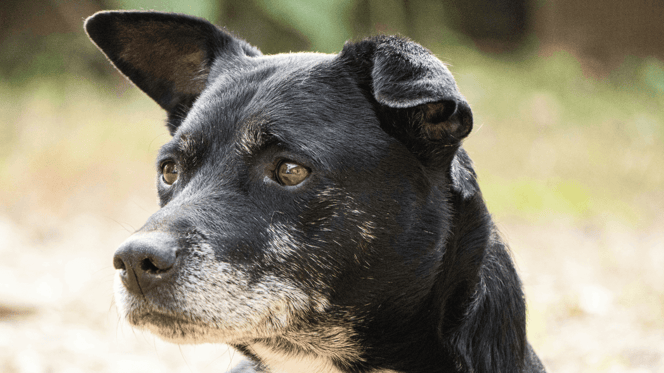Identifying dog dementia can be surprisingly challenging in its early stages. Owners often attribute odd behaviours to normal ageing, but specific behavioural changes in dogs can indicate there's something more to look out for.
Remaining attentive to these developments is crucial, since many dogs instinctively hide discomfort until more serious cognitive hurdles arise.
Alzheimer's in dogs: What to look out for
The most noticeable clinical signs of canine cognitive dysfunction include disorientation, wandering aimlessly or appearing lost in familiar surroundings. Many of these behaviours mirror aspects of human Alzheimer's. Memory loss may cause a dog to forget established routines or struggle to follow guidance from their owners.
Some dogs will stand facing a wall or gazing blankly into space. Others may start having accidents, where they have previously always been housetrained. Restlessness or an increase in sleep may also indicate your dog is experiencing symptoms of dog dementia.
Behaviour changes to monitor
Changes in behaviour are always a cause for concern, as they can indicate underlying medical issues.
When it comes to CDD, you may notice long-standing habits suddenly vanishing. Your dog may seem less responsive to commands or less affectionate, withdrawing from people and other animals within the home.
Irritability or anxiety sometimes emerge without warning. If you notice sudden aggression or reactivity, this may be an early hint that cognitive decline is taking hold.
If you notice your elderly dog behaving differently, it's important to speak to your veterinarian. While certain behaviours can be symptoms of CDD and there is a prevalence of the condition in older dogs, it's important to ensure your veterinary team rule out any other contributing factors.
What causes dog dementia?
Ageing is the primary cause of dog dementia, as the structure and chemistry of the brain gradually change over time. Progressive deterioration impacts nerve communication and memory formation in much the same way the human brain is affected by Alzheimer's disease.
The outcome is an accumulation of damaged cells, and a decrease in essential signalling molecules, which reduces the brain's ability to process information. Senior dogs face a higher risk of developing the disorder, because these changes have more time to progress as they age.
Other contributing factors
Chronic inflammation, certain medical conditions and prolonged exposure to stress are also believed to contribute to dementia in dogs. Inadequate nutrition is also thought to accelerate the onset of cognitive decline, with some breeds believed to have a higher propensity to develop CDD.
Diagnosis of dog dementia
Diagnosing canine cognitive dysfunction is a delicate and complex process. Because the disorder shares so many traits with the normal ageing process, your veterinarian will typically combine detailed history-taking with the exclusion of other medical conditions.
The information you're able to give your vet about your dog's behaviour will be vital during the process. Physical examination helps rule out vision or hearing loss, which could explain apparent cognitive decline. Laboratory testing will check organ function and metabolic balance, as non-neurological diseases can also lead to confusion and changes in personality.
There is no single test that definitively diagnoses dementia, so your veterinarian will use a comprehensive strategy and a process of elimination to carry out their evaluation.
Treatment and management of dog dementia
Dogs with canine cognitive dysfunction require ongoing support. There is currently no cure for the condition, but there are ways to lessen symptoms and its impact on your dog's quality of life.
Management typically focuses on adapting the environment, offering environmental enrichment for mental stimulation, and providing nutritional support.
Environmental adaptations
Simple adjustments around the house can make a big difference to senior dogs learning to cope with cognitive changes. Keeping furniture arrangements and routines the same will help minimise confusion.
Providing clear pathways, night lights and easy access to water bowls can reduce the risk of disorientation and stress.
Nutrition and supplements
Diets rich in antioxidants and essential fatty acids can help with brain health, potentially slowing the progression of the disease. Omega-3s and vitamins E and C are also believed to help delay cognitive decline in dogs.
Medication
Medication that boots dopamine activity and regulate the damage to enzymes linked to cognitive dysfunction may be prescribed by your veterinarian, and there are other non-pharmaceutical therapies you can try at home.
Puzzle toys, scent games and gentle training exercises can help slow memory loss, boosting confidence and providing mental stimulation.
Navigating your dog's journey with CCD requires patience, compassion and close observation. Familiar scents, sounds and favourite foods - along with plenty of company and reassurance- will help ensure your senior dog feels supported and safe in their later years.



